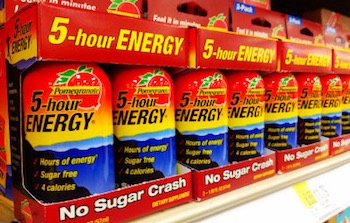
“5-hour Energy” by Mike Mozart. Licensed under CC BY 2.0.
On Monday, November 29th, a federal jury in the U.S. District Court for the Northern District of California (N.D. Cal.) found Joseph and Adriana Shayota guilty of manufacturing and selling millions of counterfeit bottles 5-hour ENERGY. They were kingpins in a criminal ring of 11 people charged with the counterfeiting. Eight of the conspirators have already plead guilty and one is a fugitive. Their clandestine factory was located in San Diego, and employed more than 50 workers working two shifts per day. They manufactured about 4.3 million counterfeits, all of which were either consumed or seized by 2012.
According to court documents, the case goes back to 2009, when California resident Joseph Shayota approached Living Essentials, the company which manufactures the famous 5-hour ENERGY supplement, to purchase 5-hour ENERGY bottles with Spanish-language packaging for resale in Mexico. Because the 5-hour ENERGY bottles were not for sale in the U.S., Living Essentials sold the product to Shayota at a 40 percent discount. Immediately, Shayota tried to divert the product into the U.S. marketplace but failed because retailers did not want to buy the Spanish-language packaging version of the product.
To get around this problem, Shayota concocted a scheme to repackage the 5-hour ENERGY bottles with counterfeit English-language packaging. Authentic labels were removed from the drink bottles and counterfeit labels were shrink-wrapped in their place to achieve the authentic look of domestic 5-hour ENERGY packaging. Lot codes and expiration dates were also removed from the bottles using solvent and false lot codes and expiration dates were applied to the bottles with the use of an industrial printer. The bottles were finally packaged in counterfeit display boxes for sale to retailers. 350,000 bottles of 5-hour ENERGY were repackaged in this way and then sold in the U.S. market at a 15 percent discount from what Living Essentials charged for the authentic product. Shayota and other members of the conspiracy sold off the remainder of its original stock of repackaged 5-hour ENERGY bottles by December 2011.
Having a working business model in place and seeing no reason to stop, the defendants turned to counterfeiting the actual 5-hour ENERGY product and not just its packaging. More than seven million counterfeit label sleeves and hundreds of thousands of counterfeit display boxes were purchased by the defendants from printing companies between December 2011 and October 2012. The plastic bottles and caps for the counterfeit products were sourced from Guadalajara, Mexico. Distribution of the counterfeit product ramped up between March 2012 and October 2012, during which time more than four million bottles of counterfeit 5-hour ENERGY product entered the U.S. market through a wholesale company owned by one of the defendants. The co-conspirators in their emails to each other referred to the counterfeit energy supplement they were manufacturing using the code word “michelada”, which is the name for a beer, hot sauce and lime cocktail indigenous to Mexico.
By the time that the counterfeit operation was in full bloom, 11 individuals were involved in the crime ring. Joseph Shayota and his wife Adriana, funded the scheme, including paying for the sophisticated manufacturing equipment and counterfeit packaging. Justin Shayota, a resident of Michigan, managed the factory where the counterfeits were manufactured. Michigan resident Walid Jamil, aided by his brother Raid, organized and supervised the entire counterfeiting operation. Another set of brothers, Kevin and Fatti Atiq, both of California, co-owned the Dee-Dee Company which distributed the counterfeit 5-hour ENERGY to wholesalers nationwide. Juan Romero, another California resident, managed the production of the actual counterfeit drink to be shipped to Justin Shayota. Mario Ramirez, a California resident, was hired by Walid Jamil to design and manufacture the counterfeit cardboard display boxes, and Mario was aided in this production by his son Camilo.

Geoff Potter, Partner at Patterson Belknap Webb & Tyler
According to Geoffrey Potter, a partner at Patterson Belknap Webb & Tyler, Living Essentials only became aware of the infringing products when a broker reported to the company that one of his very good customers stopped purchasing from him yet still was selling the product. The broker obtained a sample and discovered to his shock that it was counterfeit. “To me and you, it looks perfect” Potter said. Tiny details on the packaging were wrong, such as a missing mold marking which is found on the top of authentic 5-hour ENERGY bottles. The drink itself smelled wrong and was dyed to match the flavor; for example, red berry flavor was dyed red and orange flavor was dyed orange. But authentic 5-hour ENERGY is not dyed at all. “The coloring made the counterfeit obvious, because the factory that makes authentic 5-hour ENERGY does not use any artificial coloring” Potter said.
As soon as the company discovered its product was counterfeited, it hired Potter who assembled a team of 85 investigators to visit stores nationwide to search for counterfeit 5-hour ENERGY. When counterfeit products were found, Potter and his associates filed civil actions and obtained ex parte seizure orders from courts which empowered him to freeze the counterfeiters’ assets, seize the counterfeits, as well as the counterfeiters’ computers and documents. The orders also allowed Potter to take immediate depositions. The depositions, computer data and documents allowed Potter to discover the other participants and then to obtain seizure orders against those farther up the distribution chain. Using this method, it took about four weeks for counsel to go up the distribution chain and find and stop all of the 5-hour ENERGY counterfeiters, a group which someone close to the operation once described as “Sopranos wannabies.” Potter seized more than 2.6 million counterfeit bottles from the factory, warehouses and store shelves.
Following the civil action, the U.S. federal government brought criminal charges against the counterfeiters which resulted in the eight guilty pleas and Monday’s two convictions. Potter said that “this is, as far as we know, the first time that the U.S. Department of Justice (DOJ) has ever brought to trial people for counterfeiting a food product in the U.S.”
Potter said that criminal convictions of counterfeiters are very important because they “profoundly change the counterfeiter’s risk versus reward calculations.” He explained that counterfeiters are merely corrupt business men and women and in his opinion “civil judgments to them are merely a business expense.” However, according to Potter “spending years in prison is real deterrence.”
Tough sentencing could very likely be expected in this criminal case, which could have had the makings of a public health crisis according to statements made by DOJ officials. When the DOJ announced criminal charges in the case last June, Special Agent in Charge Lisa Malinowski was quoted as saying, “Criminals who produce and sell counterfeit and misbranded dietary supplements put the public health at risk by utilizing unknown and unregulated ingredients that could put the consumer in danger of serious illness or death.” But this is a crisis which has been by and large averted thanks to the outcome of the legal enforcement against 5-hour ENERGY counterfeits. “Quick action by the company and federal authorities ensured that all remaining counterfeits were removed from stores years ago, and today only authentic bottles of 5-Hour ENERGY are in stores and consumers can purchase the product with complete assurance that they are buying a safe authentic product,” Potter said.

![[IPWatchdog Logo]](https://ipwatchdog.com/wp-content/themes/IPWatchdog%20-%202023/assets/images/temp/logo-small@2x.png)

![[Advertisement]](https://ipwatchdog.com/wp-content/uploads/2024/04/Artificial-Intelligence-2024-REPLAY-sidebar-700x500-corrected.jpg)
![[Advertisement]](https://ipwatchdog.com/wp-content/uploads/2024/04/UnitedLex-May-2-2024-sidebar-700x500-1.jpg)
![[Advertisement]](https://ipwatchdog.com/wp-content/uploads/2024/04/Patent-Litigation-Masters-2024-sidebar-700x500-1.jpg)

![[Advertisement]](https://ipwatchdog.com/wp-content/uploads/2021/12/WEBINAR-336-x-280-px.png)
![[Advertisement]](https://ipwatchdog.com/wp-content/uploads/2021/12/2021-Patent-Practice-on-Demand-recorded-Feb-2021-336-x-280.jpg)
![[Advertisement]](https://ipwatchdog.com/wp-content/uploads/2021/12/Ad-4-The-Invent-Patent-System™.png)






Join the Discussion
No comments yet.